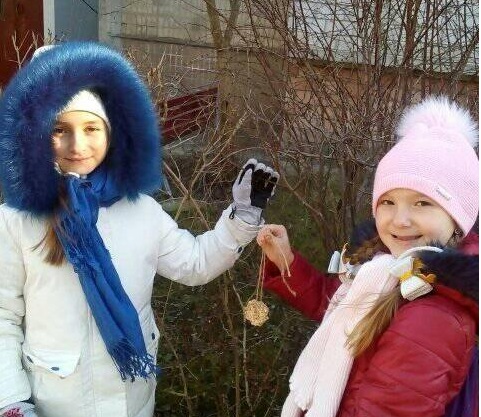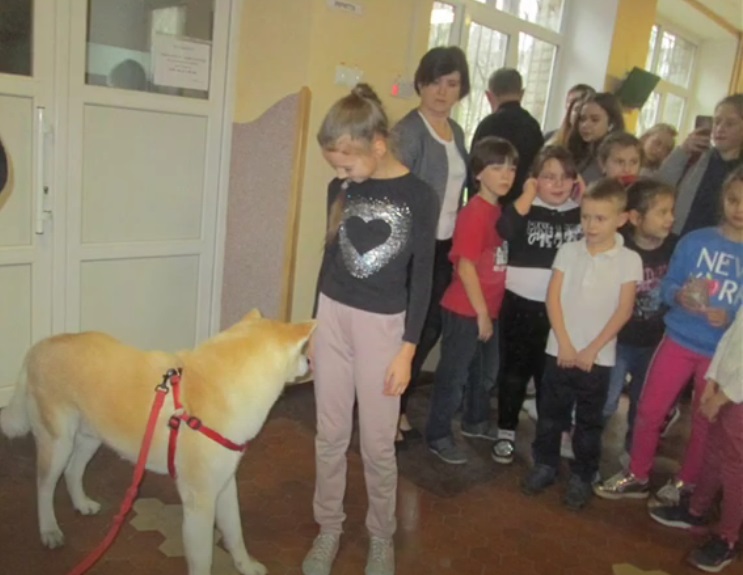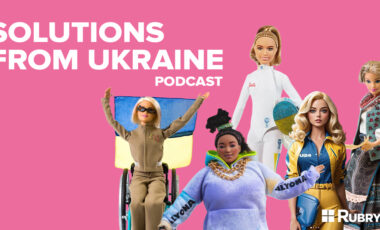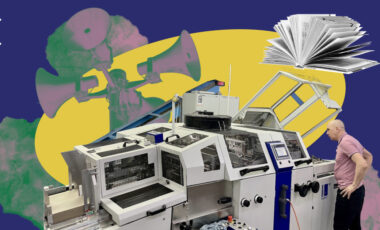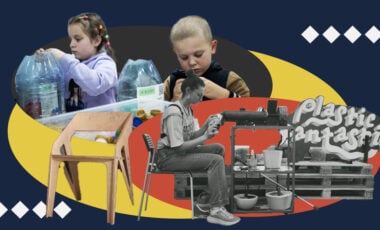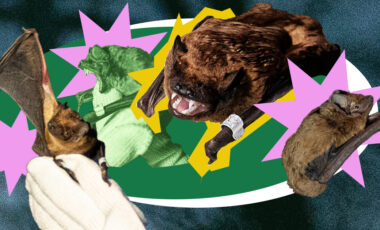Cat feeders by schoolchildren: how they help homeless animals in Lviv
Such initiatives are strikingly relevant now: in biting frosts when animals need our help more than ever.
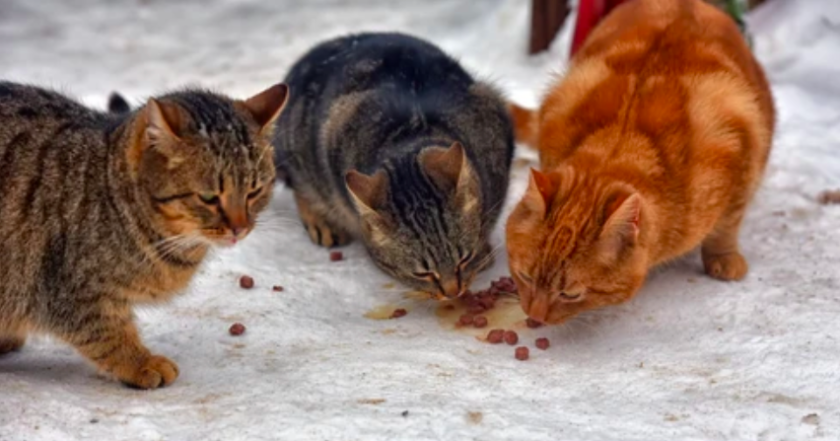
With nipping frosts arriving in Ukraine, the problem of homeless animals became especially acute. Animal activists, taking care of street dogs and cats, are doing everything possible to save their wards from the cold, and urging their compatriots not to be indifferent. It's easy to show humanity: letting a dog or cat into the building to warm up or spend the night, not closing the sewer holes in the basement, arranging simple houses or insulated hiding places for the four-legged homeless, and, of course, not forgetting to feed them. After all, in the cold season, homeless animals almost can't find any food without human help.
Recently, Rubryka reported on how students of school № 77 in Lviv helped animals and birds survive the winter by installing feeders on the city streets. We'll explain the initiative of Lviv schoolchildren in more detail.
Dogs and cats need kindness
According to Iryna Boyko, a teacher of foreign literature, the idea of supporting homeless animals isn't new for students: "It's not the first year we've written about animal problems in a big city in the school newspaper "Khvylynka." Last year, we came up with a project idea to single-handedly help homeless cats and dogs. We took part in an environmental project on waste sorting — it's our school's specialty — "Sustainable Development"; we even have a subject (school №77 is an educational institution with in-depth study of economics and management – ed.) on how to give a second life to unnecessary things, so we sewed mattresses and pillows for the wards of the Lviv animal shelter "Lev."
They bragged about their intention in the parent group and asked for help. The parents gladly responded because everyone has old things suitable for mattresses at home: old sheets, T-shirts, sweaters. One student's mother sewed the first sample and explained the technology in detail. Last year's sixth-graders, and now 7-A class students, assiduously started sewing. They gathered after school; both boys and girls sewed. The first batch of soft dog beds was delivered to Lev Animal Shelter.
"We were given a tour of the shelter. The children walked the dogs, helped to feed them. Everyone was delighted, including the dogs," the teacher recalls. "The children asked, 'Will we return to the dogs?' We visited again; we took the feed there and bought diapers for sick animals. That's how it became a wonderful tradition."
Friendship with the shelter continued in the quarantine year. This year, children who already had experience in sewing taught and involved younger kids in the good cause. Due to quarantine restrictions, they mostly had to make things at home, but parents helped and controlled the process.
Active seventh-graders have been urging the entire school to collect food for the shelter this winter. They wrote ads, placed them on the announcement board and the windows of the first floor for parents to see. A special box was set up in the school corridor to collect donations.
The initiative was an incredible success; they collected 38 kg of dry and wet food in a short time!
Iryna Boyko, the class teacher of the restless 7-A, says: "As soon as we started collecting food, we thought about how to explain to children that it'd better spend money not on chips with cola but a pack of food for homeless animals. So we decided to teach educational mini-classes for primary school children; the classes were prepared by students. Vladislav Parfeniuk and Artem Chahaida prepared classes for the youngest students, i.e. first-graders, and second-graders. They talked to kids about their pets, asked how the children take care of their pets. Can you tease a dog? And why you may not? Do cats know how to swim? Do they like to swim? What does a hamster or a parrot love to eat? They played and did exercises: Vlad recited a poem about a cat, and children showed how the poem's hero moves.
"As we were leaving the 2-A class, one kid said, 'We also help the birds!' We asked the kid, and it turned out that the 2-A students, together with the class teacher, were making cookies for birds from different grains. Then they hang these cookies on trees and bushes around the school."
Sixth-grader Denys Pavlish prepared an educational event for students of 3-4 grades. He made a presentation on the problems of homeless animals and picked up touching photos. We discussed it as adults; kids agreed homeless cats and dogs need help.
One of the events was a children's drawing contest on the theme "Dogs and cats need kindness." Children also shared photos of their pets, which the school used to design a photo exhibition.
Cat feeders for the striped and fluffy
Denys Pavlish, a student of 6-B class: "We borrowed the idea of cat booths from the Internet; we saw that cat feeders made by volunteers began to appear in Lviv. So we joined the charity initiative."
Lviv volunteers mostly installed cat feeders in the city center. Therefore, the children talked and decided that they'd make such "booths" to place in their neighborhood. Parents and grandparents helped children to create "field canteens" for cats.
They made booths massive so that cats and dogs wouldn't throw them over, and added roofs so that the food wouldn't get wet from rain and snow. The children placed explanations on our tiny houses for the residents: what these constructions are and what they are for. "Children and I were anxious that the residents would mess up our cat feeders, "the teacher shared, "but everything went well. They accepted our idea completely and even put out water bowls. On quarantine, we feed our animals. After quarantine, we'll surely think about how to make solid street huts for cats and dogs quickly and easily. We want to make it possible and easy for children to make."
The first filling of feeders came amid a funny story: "Children run to me, shout something angry. I hear: We poured food, and then a big dog came and ate everything! I come up and see a dog, holding an empty bowl of food in his mouth and looking so pleadingly! Well, we fed him and left some for the cats."
The school administration, headed by the principal Zoriana Demchuk, responds to children's initiatives with gladness. And Irina Boyko's students convince other classes how expedient such activity is by their own example. The teacher says that even despite the quarantine, children are eager to walk animals and take care of the dogs in the Lev Animal Shelter.
There was a story at school: "I met the head of the "Dog friend" organization" Natalia Lelyk," says Iryna Boyko. "She mentioned that the organization members are happy to come to the children with their dogs. And we invited them to school. The principal said that the viewers would be 3rd graders, so we prepared a place for them in the recreation room, where the 3rd graders study. So the class is dismissed, the entire primary school comes out to the lobby, and there are dogs! Very nice and positive to the point of impossibility! The children surrounded them. They stood up like the wall and didn't leave the school. Well, we had to hold the event right in the lobby for everyone from primary school!
Love for a country begins with clemency
"I'm a teacher of foreign literature. Why do I do this? Because I love animals (I have 3 cats), sympathize with them, and try to teach it to children: to sympathize not only with animals but also with people, not to be indifferent, to see and hear those who are around, either humans or animals. And I try to teach responsibility. As Exupéry wrote: 'You become responsible, forever, for what you have tamed.' Let's start small: feed the puppy, don't hurt the cat. This way, we'll learn to respect people, value our neighbor, and build the country, spending the state money not for our own benefit but the common good."
A small package of food for homeless animals will cost like a cup of coffee but can save someone's life. A nice deed like a handful of food for homeless animals, which you can bring with you on the way to work or during a daily walk, can become a wonderful tradition for each of us.
Animal rights activists advise: forget the talk that we should keep good deeds quiet. Research shows that a person is more willing to do charity when he/she sees other people's example. Every fourth person will try to repeat the positive experience of an acquaintance or famous person, and family approval encourages every third person to do good deeds.
Feel free to talk on social media about the birds you fed, about the cat you took home from the street, about your volunteer experience, or about you transferring money to the shelter, which always needs money for literally everything. It's cool, it's okay, it's inspiring!







